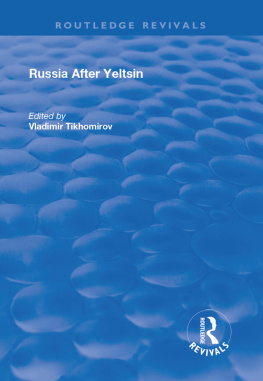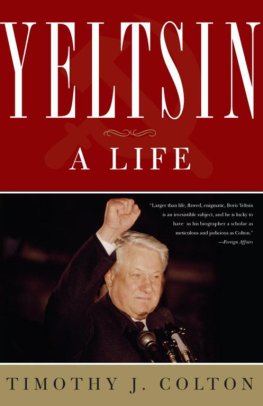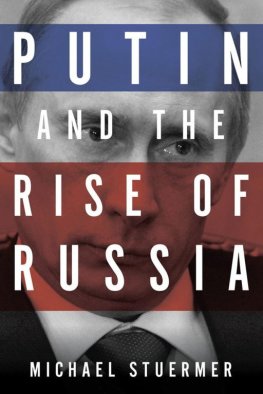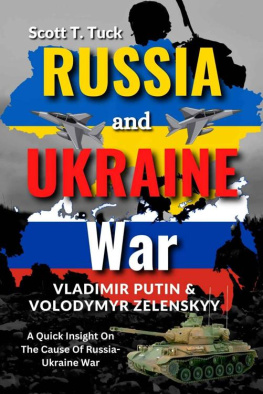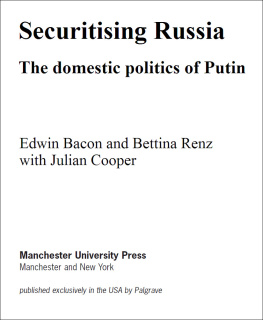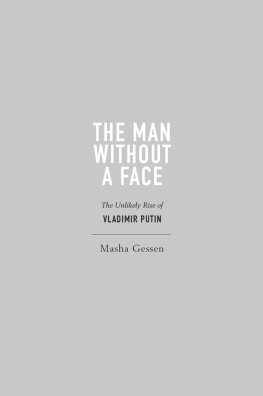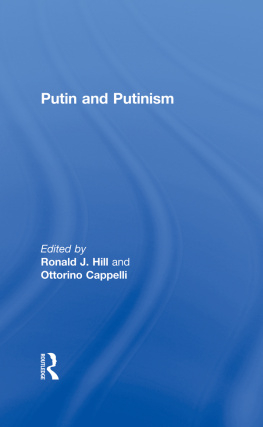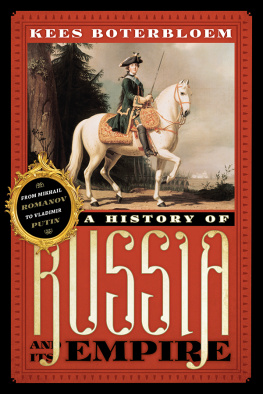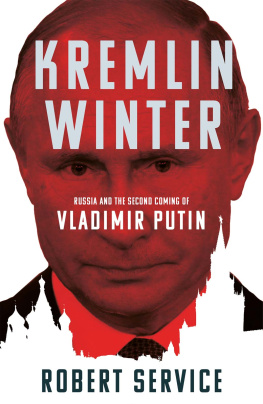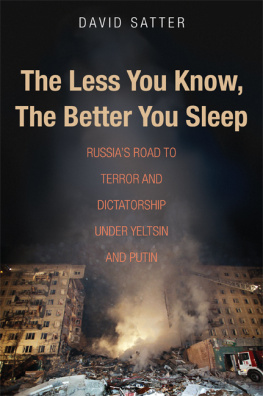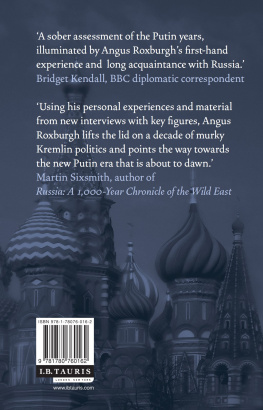First published 2001 by Ashgate Publishing
Reissued 2018 by Routledge
2 Park Square, Milton Park, Abingdon, Oxon OX14 4RN
711 Third Avenue, New York, NY 10017, USA
Routledge is an imprint of the Taylor & Francis Group, an informa business
Copyright Vladimir Tikhomirov 2001
All rights reserved. No part of this book may be reprinted or reproduced or utilised in any form or by any electronic, mechanical, or other means, now known or hereafter invented, including photocopying and recording, or in any information storage or retrieval system, without permission in writing from the publishers.
Notice:
Product or corporate names may be trademarks or registered trademarks, and are used only for identification and explanation without intent to infringe.
Publishers Note
The publisher has gone to great lengths to ensure the quality of this reprint but points out that some imperfections in the original copies may be apparent.
Disclaimer
The publisher has made every effort to trace copyright holders and welcomes correspondence from those they have been unable to contact.
A Library of Congress record exists under LC control number: 00134841
ISBN 13: 978-1-138-70368-1 (hbk)
ISBN 13: 978-1-315-20302-7 (ebk)
Stephen Fortescue is an Associate Professor of Politics at the University of New South Wales. His principal interests cover Russian politics and economics, in particular industrial management and modernisation. His current research is concentrated on the Russian mining and metals industry. He is the author of many articles and three books: Policy-Making for Russian Industry (1997), Science Policy in the Soviet Union (1990) and The Communist Party and Soviet Science (1986).
Graeme Gill is a Professor of Government and Public Administration, and Head of the School of Economics and Political Science at the University of Sydney. He is the author of Peasants and Government in the Russian Revolution (1979), The Origins of the Stalinist Political System (1990), 20th Century Russia: the Search for Power and Authority (1994), The Collapse of a Single-Party System: the Disintegration of the CPSU (1994), Power in the Party (with R.Pitty, 1997), The Dynamics of Democratization: Elites, Civil Society, and the Transition Process (2000), and Russias Stillborn Democracy? (with R.Markwick, 2000).
Leslie Holmes is a Professor of Political Science at the University of Melbourne. He specialises in transitions (esp. democratisation processes) and corruption in post-communist states. Prof. Holmes is the author of numerous articles and a number of books, including The Policy Process in Communist States: Industrial Administration and Politics (1981), Politics in the Communist World (1986), The End of Communist Power: Anti-Corruption Campaigns and Legitimation Crisis (1993), and Post-Communism (1997).
Geoffrey Jukes is an Associate at the Centre for Arab and Islamic Studies (the Middle East and Central Asia) of the Australian National University and an Associate at the Contemporary Europe Research Centre at the University of Melbourne. He has published widely on Soviet and Russian military developments and foreign policy. His books include Kursk: The Clash of Armour (1969), The Development of Soviet Strategic Thinking since 1945 (1972), The Indian Ocean in Soviet Naval Policy (1972), The Soviet Union in Asia (1973), Hitlers Stalingrad Decisions (1985), RussiasMilitary and the Northern Territories Issue (1993) and The Middle East: Prospects for Settlement and Stability? (co-edited, 1995).
Gennadi Kazakevitch is a Senior Lecturer in Economics at Monash University. His main areas of research interest are economic reforms in former communist countries, regional economic development and policy and applied regional models. His latest publications include articles on Regions in Changing Economic Environment (1999), Is the Transition already over in the Former Soviet Bloc Countries? An Attempt of Taxonomy of Post Communist Economies (1998), Privatisation of Natural Monopolies (1998), Natural Monopolies: Comparing Russian and Australian Experience (1996) and Macroeconomic Issues of Privatisation in Russia and Eastern Europe (1995).
David W. Lovell is an Associate Professor in Politics at the Australian Defence Force Academy. During the early 1990s, he edited the Political Theory Newsletter, and was managing editor of the Australian Journal of Political Science. In 1992, he was the Australian Parliamentary Political Science Fellow, and since 1993 he has been a member of the Executive Committee of the International Society for the Study of European Ideas, and is an editorial adviser on its journal, The European Legacy. His books include From Marx to Lenin (1984), Marxs Proletariat (1988), The Theory of Politics (co-authored, 1991), The Transition from Socialism (co-edited, 1992), Marxism and Australian Socialism (1997), and The Australian Political System (co-authored, 1998).
Alexey Muraviev is a Deputy Director of the International Relations Program at Curtin University of Technology. His major research interests include the Russian military power, Russias defence and foreign policy, defence and strategic studies. He has published a number of articles and co-authored a book on Russias Armed Forces in Asia (with Greg Austin, 2000).
Anthony Phillips is an Associate of the Contemporary Europe Research Centre at the University of Melbourne. His main interest is in the evolving political economy of the post-Soviet Russia. His recent publications include, Changing Characterisations of the Roots of Russias Problems: A Look at the Virtual Economy Thesis, Russian and Euro-Asian Bulletin, vol. 8, no. 2, March 1999, and The Political Economy of Russia: Transition or Condition? in Mike Bowker (ed.), Russia After the Cold War (2000).
Peter Shearman teaches International Relations and Russian Politics at the University of Melbourne. His books include The Soviet Union and Cuba (1987), The Superpowers, Central America and the Middle East (co-edited with Phil Williams, 1988) and Russian Foreign Policy Since 1990 (edited, 1995).
Vladimir Tikhomirov is a Deputy Director of the Contemporary Europe Research Centre at the University of Melbourne. He is also Chief Editor of the Russian and Euro-Asian Bulletin. His two main areas of interest are economic developments of post-Soviet Russia and transition in South Africa. He published widely and his books include The Party of Apartheid (1987), Church and the Political Struggle in South Africa (1990), Development of Political Thought in South Africa (1992), States in Transition: Russia and South Africa


